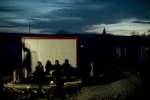- Text size
 |
|  |
|  |
| 
- Français
UNHCR launches emergency operation to improve conditions for refugees and asylum seekers in Bulgaria
Briefing Notes, 6 December 2013
This is a summary of what was said by UNHCR spokesperson Adrian Edwards – to whom quoted text may be attributed – at the press briefing, on 6 December 2013, at the Palais des Nations in Geneva.
UNHCR is providing emergency assistance in Bulgaria to improve living conditions and the protection situation for refugees and asylum seekers there. Bulgaria is currently hosting some 8,800 asylum seekers and refugees, around two-thirds of them Syrians. Poor conditions at reception facilities are being worsened by the onset of winter. Normally Bulgaria, the European Union's poorest country, receives only around 1,000 asylum seekers and refugees a year.
At Harmanli, a former military base around 50 kilometres from the border with Turkey, UNHCR began this week distributing hot meals to the 1,400 residents. They have been without proper cooking facilities and cannot leave the facility to buy food. Asylum seekers in other centres have not been receiving sufficient food. UNHCR is working with the authorities to find a solution to ensure adequate and sustainable food distribution at all centres. UNHCR is also planning to establish child-friendly spaces in each centre. In addition, we are working with partners to increase a presence in all centres for social and legal counselling and information on asylum procedures and rights. The setting-up of a health center in Harmanli by Médecins Sans Frontières (MSF) is welcome, and we encourage other humanitarian organizations to follow this example.
This week the Bulgarian authorities relocated most people who were living in summer tents to unfinished buildings, where water and sanitation systems need to be improved urgently. A group of especially vulnerable people has been transferred to more adequate facilities. The State Agency for Refugees (SAR) will recruit additional staff and will mobilize registration teams to Harmanli. To improve cooperation and coordination, weekly meetings with all partners have been established, co-chaired by SAR and UNHCR.
We are alarmed by a recent increase in xenophobic violence such as a reported attack on three asylum seekers, including two Syrian men, in Sofia this past week. We urge the authorities to take steps to stem the rising tide of xenophobia in Bulgaria. We are concerned by reports the authorities are planning to increase the use of closed facilities for asylum seekers, particularly single men. And we urge the authorities to find alternatives to detention. Seeking asylum is not a crime, and the use of detention should be a last resort. The deployment of some 1,400 police officers along the Turkish border and the construction of a 30-kilometre fence there have already reduced the numbers of people able to enter Bulgaria. There have been concerning reports of Syrians being pushed back at the border in recent weeks – contrary to the principles of international law. It is important that people fleeing for their lives are allowed access to a safe haven and ar e able to seek international protection.
For more information on this topic, please contact:
- In Budapest: Ariane Rummery (Regional) on mobile: +36 30 530 9633
- In Sofia: Boris Cheshirkov on mobile: +359 878 507 041
- In Geneva: Adrian Edwards on mobile +41 79 557 9120
- Daniel MacIsaac on mobile +41 79 200 7617







































